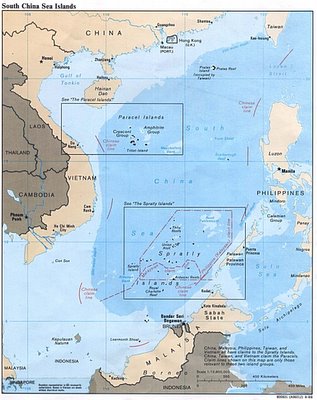American mainstream media pressing Microsoft
By DAVID BARBOZA and TOM ZELLER Jr.
Published: January 6, 2006
BEIJING, Jan. 5 - Microsoft has shut the blog site of a well-known Chinese blogger who uses its MSN online service in China after he discussed a high-profile newspaper strike that broke out here one week ago.
New York Times technology reviewer David Pogue is at the 2006 Consumer Electronics Show, posting blog entries and daily video updates. The decision is the latest in a series of measures in which some of America's biggest technology companies have cooperated with the Chinese authorities to censor Web sites and curb dissent or free speech online as they seek access to China's booming Internet marketplace.
Microsoft drew criticism last summer when it was discovered that its blog tool in China was designed to filter words like "democracy" and "human rights" from blog titles. The company said Thursday that it must "comply with global and local laws."
"This is a complex and difficult issue," said Brooke Richardson, a group product manager for MSN in Seattle. "We think it's better to be there with our services than not be there."
The site pulled down was a popular one created by Zhao Jing, a well-known blogger with an online pen name, An Ti. Mr. Zhao, 30, also works as a research assistant in the Beijing bureau of The New York Times.
The blog was removed last week from a Microsoft service called MSN Spaces after the blog discussed the firing of the independent-minded editor of The Beijing News, which prompted 100 journalists at the paper to go on strike Dec. 29. It was an unusual show of solidarity for a Chinese news organization in an industry that has complied with tight restrictions on what can be published.
The move by Microsoft comes at a time when the Chinese government is stepping up its own efforts to crack down on press freedom. Several prominent editors and journalists have been jailed in China over the last few years and charged with everything from espionage to revealing state secrets.
Another research assistant for The New York Times, Zhao Yan (no relation to Zhao Jing), was indicted last month on charges that he passed state secrets to the newspaper, which published a report in 2004 about the timing of Jiang Zemin's decision to give up the country's top military post.
China closely monitors what people here post on the Internet and the government regularly shuts Web sites and deletes postings that are considered antigovernment. A spokeswoman for Microsoft said the company had blocked "many sites" in China. The MSN Spaces sites are maintained on computer servers in the United States.
Ms. Richardson of Microsoft said Mr. Zhou's site was taken down after Chinese authorities made a request through a Shanghai-based affiliate of the company.
The shutdown of Mr. Zhao's site drew attention and condemnation this week elsewhere online. Rebecca MacKinnon, a fellow at the Berkman Center for Internet and Society at Harvard Law School, wrote on her blog, referring to Microsoft and other technology companies: "Can we be sure they won't do the same thing in response to potentially illegal demands by an overzealous government agency in our own country?"
Robert Scoble, a blogger and official "technology evangelist" for Microsoft, took a public stand against the company's action. "This one is depressing to me," he wrote on Tuesday. "It's one thing to pull a list of words out of blogs using an algorithm. It's another thing to become an agent of a government and censor an entire blogger's work."
Another American online service operating in China, Yahoo, was widely criticized in the fall after it was revealed that the company had provided Chinese authorities with information that led to the imprisonment of a Chinese journalist who kept a personal e-mail account with Yahoo. Yahoo also defended its action by saying it was forced to comply with local law.
Mr. Zhao is so well known as a blogger that he served as China's lone jury member last year in Germany for a world blog competition.
A former computer programmer, Mr. Zhao worked as a journalist for a Chinese newspaper and as a research assistant for The Washington Post before joining The New York Times in 2003.
Mr. Zhao, in an interview this evening, said he had kept a personal blog for more than a year and was regularly censored in China, even though he has tried to be careful not to write about significant issues related to his work at The Times.
He was apparently one of the first on the Internet to mention that several editors could be fired from The Beijing News. He said he posted something about possible firings on Dec. 28.
Two days later, after the top editor there was dismissed, Reuters reported that about a hundred journalists had gone on strike over the dispute and added that several Chinese blogs and Internet chat rooms were discussing the issue. The report said Mr. Zhao had used his blog to urge readers to cancel their subscriptions.
Mr. Zhao said in an interview Thursday that Microsoft chose to delete his blog on Dec. 30 with no warning. "I didn't even say I supported the strike," he said. "This action by Microsoft infringed upon my freedom of speech. They even deleted my blog and gave me no chance to back up my files without any warning."
David Barboza reported from Beijing for this article and Tom Zeller Jr. from New York.
more







